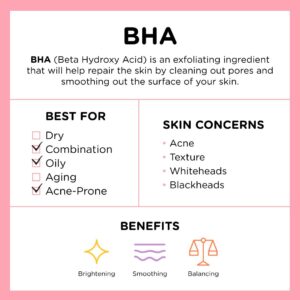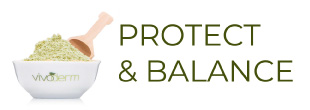
AHAs vs Beta hydroxy acids (BHAs)
This article is published in DERMASCOPE Magazine, June 2023 edition – written by Rachelle Dupree
https://www.dermascope.com/freedigital/June2023/?page=87
Beta hydroxy acids (BHAs) are mild acids and gentle chemical exfoliants commonly used in skin care treatments to improve the appearance and health of skin. First used in skin care in the 1970s, beta hydroxy acids are a type of hydroxy acid, or organic compounds containing a hydroxyl (OH) group.
AHAs vs BHAs
In the world of skin care products, the most common acid-based ingredients are beta hydroxy acids and alpha hydroxy acids. Both are typically naturally derived from plant materials, although some are synthesized. While they both perform similar functions, the difference is the chemical compound structure between the two. While alpha hydroxy acids are separated from the hydroxy part of the molecule by one carbon atom, beta hydroxy acids are separated by two carbon atoms. This distinction means that common beta hydroxy acids are oil-soluble and have a greater ability to penetrate the lipid layers between skin cells, while alpha hydroxy acids are water-soluble and cannot penetrate skin at a deeper layer. This makes beta hydroxy acids the superior choice ingredient for treating acne.
SKIN CARE
Commonly derived from natural sources such as plants, tree bark, fruit, some dairy products, as well as synthetic sources, beta hydroxy acids have a number of beneficial properties that make them useful for oily and acne-prone skin. Beta hydroxy acids’ oil-soluble structure also means they can break down dirt and other debris from skin to remove impurities. This makes them effective at treating a variety of skin conditions including blackheads and whiteheads.
They also assist with basal cell layer stimulation and remove surface cells, which can reduce the appearance of fine lines and wrinkles in addition to hyperpigmentation Beta hydroxy acids are also anti-inflammatory, meaning they can help reduce the redness and inflammation associated with acne and other skin conditions.
Salicylic Acid
One of the most common types of beta hydroxy acids is salicylic acid (a derivative of salicin), a natural ingredient derived from plants such as willow bark and oil of wintergreen. As a keratolytic medication, it is one of the most popular ingredients in acne treatments and works by dissolving some of the deeper pore-clogging bonds between skin cells. This effect also produces easy exfoliation by softening or sloughing off the top layer of skin.
It is generally considered safe for most skin types when used as directed. But be aware of contraindications for dry, sensitive skin or hyperreactive skin. It is also advised to refrain from using products containing salicylic acid as an allover body treatment – for instance, on large patches of acneprone skin, like the back area – as this could contribute to salicylate poisoning.
PUT IT INTO PRACTICE
Beta hydroxy acids are a versatile and effective ingredient that can be found in a variety of skin care products, including facial cleansers, facial serums, exfoliants, masks, and moisturizers. Most drugstores, beauty stores, online skin care shops, and even some grocery stores carry a variety of products containing beta hydroxy acid ingredients. Depending on the skin care professional’s needs, private-label options are available in addition to professional skin care lines.
Products are typically applied to skin once or twice daily and may be combined with other active ingredients to enhance their effect. It is important to only use complementary products in conjunction with beta hydroxy acids in the correct sequence to avoid negative interactions. When choosing beta hydroxy acid-based products, it is most important to choose the product with the right concentration for the client’s skin type and always follow any special instructions.
The Right Products
Cleansers: One of the easiest ways to incorporate beta hydroxy acids into a skin care routine is through a facial cleanser. When choosing a beta hydroxy acid-based facial cleanser, look for a product with a concentration of 0.5% to 2% beta hydroxy acids. Higher concentrations can be too harsh for some skin types while lower concentrations may not be effective. To help maintain healthy skin, these cleansers should only be used once or twice a week to improve skin tone and texture.
Serums: Beta hydroxy acids are most commonly incorporated through facial serums, which are typically applied after cleansing and toning. When choosing a beta hydroxy acid-based serum, look for a product with a concentration of 1% to 2%.
Masks: Beta hydroxy acids in facial masks are typically used once or twice a week to deeply cleanse and exfoliate skin. Look for mask products with a concentration of 2% to 5% beta hydroxy acids.
FINAL CONSIDERATIONS
It is important to note that beta hydroxy acids can be harsh for some skin types and can cause dryness, redness, and irritation. If a client has sensitive skin, it is best to use beta hydroxy acid-based products sparingly and to patch test before using them on a larger area of the face. Additionally, professionals should recommend the use of a good quality sunscreen alongside.
Overall, beta hydroxy acids are a popular and effective skin care ingredient that can provide a variety of benefits for many skin issues. By incorporating beta hydroxy acids into spa treatments, professionals can help their clients improve the appearance of their skin and reduce the risk of breakouts.

Vivoderm Herbal Facial Mask
NOTE:
References
1. Arif, T (2015). Salicylic acid as a peeling agent A comprehensive review. C inical, Cosmetic and lnvestigational Dermatology, 455-461. https://doi.org/10.2147 /ccid.s84765
2. Gancev1ciene, R, Uakou, A. I., Theodoridis, A, Makrantonaki, E., & Zouboulis, C. C. (2012) Skin anti-aging strategies. Dermato-Endocrinology, 4(3), 308-319. https://doi.org/10.4161/ derm.22804
3 Encycloped1a.com. (2020, August 12). Beta Hydroxy. Encycloped1a.com. Retrieved April 20, 2023, from https:/www.encyclopedia.com/medicine/encyclopedias-almanacs-transcripts· and-maps/beta-hydroxy
* Rachelle Dupree has over 20 years of experience in marketing, media, communications, and design. She studied with a Denver-based herbalist and naturopath for four years, combining her marketing knowledge with her love of natural remedies and skin care. She currently works as a marketing and communications director for Vivoderm Natural Skincare and various design clients.





